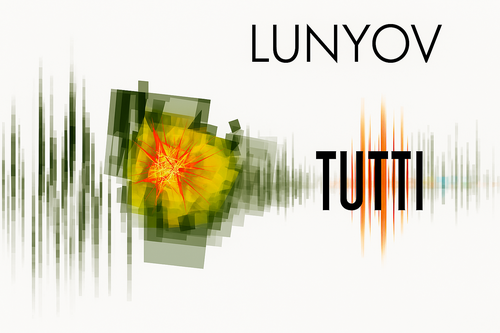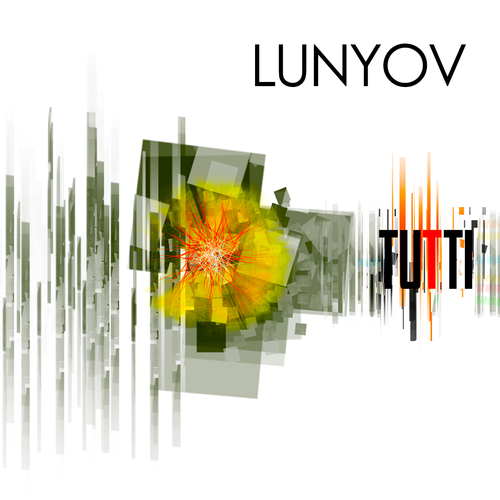Among the many compositions of Svyatoslav Lunyov (b. 1964) — one of the most successful and enigmatic Ukrainian composers of our time — the orchestral piece TUTTI holds a special place. Written in 2005, the work is often referred to as Lunyov’s magnum opus and is frequently mentioned in rankings of the greatest classical pieces composed during Ukraine’s independence.
The word tutti, Italian for “all” or “everyone,” is a musical term used to describe sections in which all instruments or voices sound together. Here, TUTTI is more than a title — it is an instruction, a call, a demand: to sound together. Yet this togetherness is not about unity or harmony in the traditional sense, but about a cosmic equilibrium — a universe in which utter stillness and ultimate tension, blinding light and engulfing darkness, sonic dominance and celestial silence coexist in balance.
Musicologist Iryna Tukhova likens the piece to a “Big Bang” — the origin of a world in the making. And indeed, TUTTI feels like a grand construction site, where every gesture and element, every participant and process, plays a vital role. The paradox of TUTTI lies in its simultaneous celebration of collective sound and the structured monologues of each timbral voice.
There is no traditional symphonic development here. Instead, the composition maps out an acoustic topography — of volume, confrontation, accumulation, and concentration of energy. Rather than composing themes, Lunyov sculpts planes of sound, shaping massive sonic waves that echo with the clamor of the entire universe.
Embedded in TUTTI is Lunyov’s musical philosophy: sound as a means of co-existence, insight, and transformation. The piece reveals his deep affinity for textural thinking, analytical control over chaos, and his vision of the orchestra as a holistic, psychologically and philosophically charged instrument.
The word tutti, Italian for “all” or “everyone,” is a musical term used to describe sections in which all instruments or voices sound together. Here, TUTTI is more than a title — it is an instruction, a call, a demand: to sound together. Yet this togetherness is not about unity or harmony in the traditional sense, but about a cosmic equilibrium — a universe in which utter stillness and ultimate tension, blinding light and engulfing darkness, sonic dominance and celestial silence coexist in balance.
Musicologist Iryna Tukhova likens the piece to a “Big Bang” — the origin of a world in the making. And indeed, TUTTI feels like a grand construction site, where every gesture and element, every participant and process, plays a vital role. The paradox of TUTTI lies in its simultaneous celebration of collective sound and the structured monologues of each timbral voice.
There is no traditional symphonic development here. Instead, the composition maps out an acoustic topography — of volume, confrontation, accumulation, and concentration of energy. Rather than composing themes, Lunyov sculpts planes of sound, shaping massive sonic waves that echo with the clamor of the entire universe.
Embedded in TUTTI is Lunyov’s musical philosophy: sound as a means of co-existence, insight, and transformation. The piece reveals his deep affinity for textural thinking, analytical control over chaos, and his vision of the orchestra as a holistic, psychologically and philosophically charged instrument.
Text: Victoriia Antoshevska
Translated into English by Taras Demko
Translated into English by Taras Demko
Listen to music
Слухати музику
Тутті
Луньов Святослав
Серед десятків творів Святослав Луньова (1964*) – одного з найуспішніших та найзагадковіших українських композиторів сучасності – твір “TUTTI” для симфонічного оркестру посідає особливе місце. Написану у 2005 році композицію часто називають magnum opus Луньова та згадують її у рейтингах найкращої академічної музики, створеної за часів незалежної України.
З італійської “tutti” перекладається як “всі”. Це поширений музичний термін, що означає епізоди твору, в яких разом звучать всі інструменти/голоси. Отож, “TUTTI” – не просто назва. Це інструкція, заклик, вимога: звучати разом. І це «разом» далеко не про єдність й злагодженість, а про гармонію всесвіту, в якому ідеально збалансовано абсолютний спокій та граничну напругу, засліплююче світло й поглинаючу темряву, панування звуку і космічну тишу. У музикознавиці Ірини Тукової твір викликає асоціації з великим вибухом, після якого розпочинається створення світу. Й справді, “TUTTI” нагадує захоплююче “будівництво”, де важливий кожен рух та елемент, кожен учасник та процес. Парадокс “TUTTI” у тому, що це водночас апофеоз колективного звучання й структуровані монологи кожного з тембрів. У “TUTTI” відсутній класичний симфонічний розвиток, це радше створення акустичної топографії гучності, протистояння, накопичення, концентрація енергії. Автор компонує не теми, а площини звуку, формує велетенські звукові хвилі, в яких лунає гамір цілого всесвіту.
У цьому творі – вся філософія Святослава Луньова: музика як спосіб співбуття, пізнання, трансформації. Твір наочно демонструє тяжіння Луньова до текстурного мислення, аналітичного контролю над хаосом і перетворення оркестру в цілісний психологічно-філософський інструмент.
Виконавці: Національний симфонічний оркестр України, Володимир Сіренко – дириґент
З італійської “tutti” перекладається як “всі”. Це поширений музичний термін, що означає епізоди твору, в яких разом звучать всі інструменти/голоси. Отож, “TUTTI” – не просто назва. Це інструкція, заклик, вимога: звучати разом. І це «разом» далеко не про єдність й злагодженість, а про гармонію всесвіту, в якому ідеально збалансовано абсолютний спокій та граничну напругу, засліплююче світло й поглинаючу темряву, панування звуку і космічну тишу. У музикознавиці Ірини Тукової твір викликає асоціації з великим вибухом, після якого розпочинається створення світу. Й справді, “TUTTI” нагадує захоплююче “будівництво”, де важливий кожен рух та елемент, кожен учасник та процес. Парадокс “TUTTI” у тому, що це водночас апофеоз колективного звучання й структуровані монологи кожного з тембрів. У “TUTTI” відсутній класичний симфонічний розвиток, це радше створення акустичної топографії гучності, протистояння, накопичення, концентрація енергії. Автор компонує не теми, а площини звуку, формує велетенські звукові хвилі, в яких лунає гамір цілого всесвіту.
У цьому творі – вся філософія Святослава Луньова: музика як спосіб співбуття, пізнання, трансформації. Твір наочно демонструє тяжіння Луньова до текстурного мислення, аналітичного контролю над хаосом і перетворення оркестру в цілісний психологічно-філософський інструмент.
Виконавці: Національний симфонічний оркестр України, Володимир Сіренко – дириґент
Текст: Вікторія Антошевська
Переклад: Тарас Демко
Переклад: Тарас Демко


